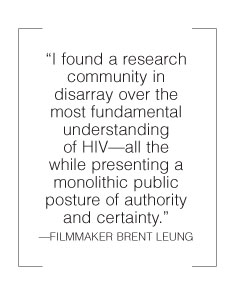| Watermark, Greg Stemm |
|
House of Numbers documentary claims new truths behind HIV/AIDS
23/11/2010 As the world focuses on the HIV/AIDS epidemic during annual World AIDS Day services and remembrances, a documentarian is taking a different approach to spur discussion about the disease.  Filmmaker Brent Leung’s critically acclaimed film, House of Numbers, asks some hard-hitting—and somewhat disturbing—questions. The film unveils candid conversations on several key points surrounding the epidemic: Why does the definition of AIDS change from country to country and over time? Why do esteemed scientists debate over the HIV virus? Are HIV tests reliable globally? Are the worldwide statistics correct? What are the dangers of the drug treatments? The answers presented by leading experts and renowned scientists as well as those living with the disease are often surprising. “At journey’s end I find myself perplexed, bewildered at times and with an overall feeling of sadness and dismay,” says Leung.“I found a research community in disarray over the most fundamental understanding of HIV—all the while presenting a monolithic public posture of authority and certainty.” Leung, who was born in 1980, grew up as part of the “AIDS generation”—he’s never known a world without it. Yet with all of its notoriety, he realized the average person did not know much about HIV and AIDS. What began as a 15-minute film project built around the simple question “What is HIV/AIDS?” revealed itself to be a much deeper journey. The journey takes the viewer into some strange territory, where it is possible to receive an AIDS diagnosis in one country and not even test positive for the HIV antibodies in another. Through interviews with experts and with those infected and living with the virus, Leung exposes how some less developed areas of the globe diagnose AIDS by sight of symptoms alone in absence of testing facilities, a process called the “Bangui diagnosis.” This can lead to dramatic overstatements on the actual number of AIDS cases. One of the more interesting segments of the film takes viewers to cities across the globe—London, Paris, Sydney, New York, Johannesburg—and asks people on the street if they know the difference between HIV and AIDS. Despite millions of dollars in public education, the answers across the planet were fairly uniform in their lack of understanding of the disease itself or the virus that many say causes it. In fact, the very idea of AIDS being an illness is challenged in the video, rather some would classify it as a “condition” or “set of conditions”. Some experts interviewed also express their belief that while HIV may contribute to the development of AIDS there may be other “co-factors” that could play a role as well. The film strongly suggests that the poor sanitation and living conditions found in 90% of the areas of the world most affected by the disease could be a contributing factor as well. The film states this is particularly true in Africa. Leung also doesn’t shy away from controversy and interviews a number of respected experts who challenge the very notion that HIV causes AIDS. Perhaps most outspoken is Dr. Peter Duesburg, professor of molecular and cell biology at Berkley. On the basis of his experience with retroviruses, Duesberg has challenged the virus—AIDS hypothesis in the pages of such journals as Cancer Research, Lancet, Proceedings of the National Academy of Sciences, and The New England Journal of Medicine. Beginning in 1987, he instead proposed the hypothesis that the various American/European AIDS diseases are brought on by the logterm consumption of recreational drugs and/or AZT itself, which is prescribed to prevent or treat AIDS. His book, Inventing the AIDS Virus (1996), was described by its New York Times reviewer as “an assault in Mr. Duesberg’s war on what he perceives to be a monolithic scientific establishment.” Interestingly enough, other than a hypothesis about recreational drug use as a co-factor or the use of an earlier AIDS drug which is rarely prescribed any longer, none of those who challenge the HIV theory present any truly viable alternative theories other than ones based on conjecture or opinion rather than hard scientific data. Perhaps one of the most revelatory parts of the film is an interview with Professor Luc Montagnier MD, 2008 Nobel Prize winner for discovering the HIV virus. He states his belief that, “we can be exposed to HIV many times without being clinically infected. Our immune system will get rid of the virus within a few weeks, if you have a good immune system.” Montagnier adds that he thinks an impoverished person living in Africa or Asia can clear the virus simply by building up their weakened immune system.  Leung challenges everything from how we currently test for HIV infection to the toxicity of both earlier as well as current drugs. He tells heartbreaking stories of patients who were apparently healthy even with an AIDS diagnosis until they began taking the prescribed medication which either made them very ill or ended their lives. House of Numbers has been screened at some of the most prestigious film festivals in North America and has won a long list of awards including Best of Festival (Docuwest Film Festival, 2009 and Washougal International Film Festival, 2009). The film premiered at the Nashville and the Boston Film Festival in April 2009. House of Numbers is 89 minutes long and is now available through multiple video on demand services. DVDs are also available online at HouseOfNumbers.com. |
